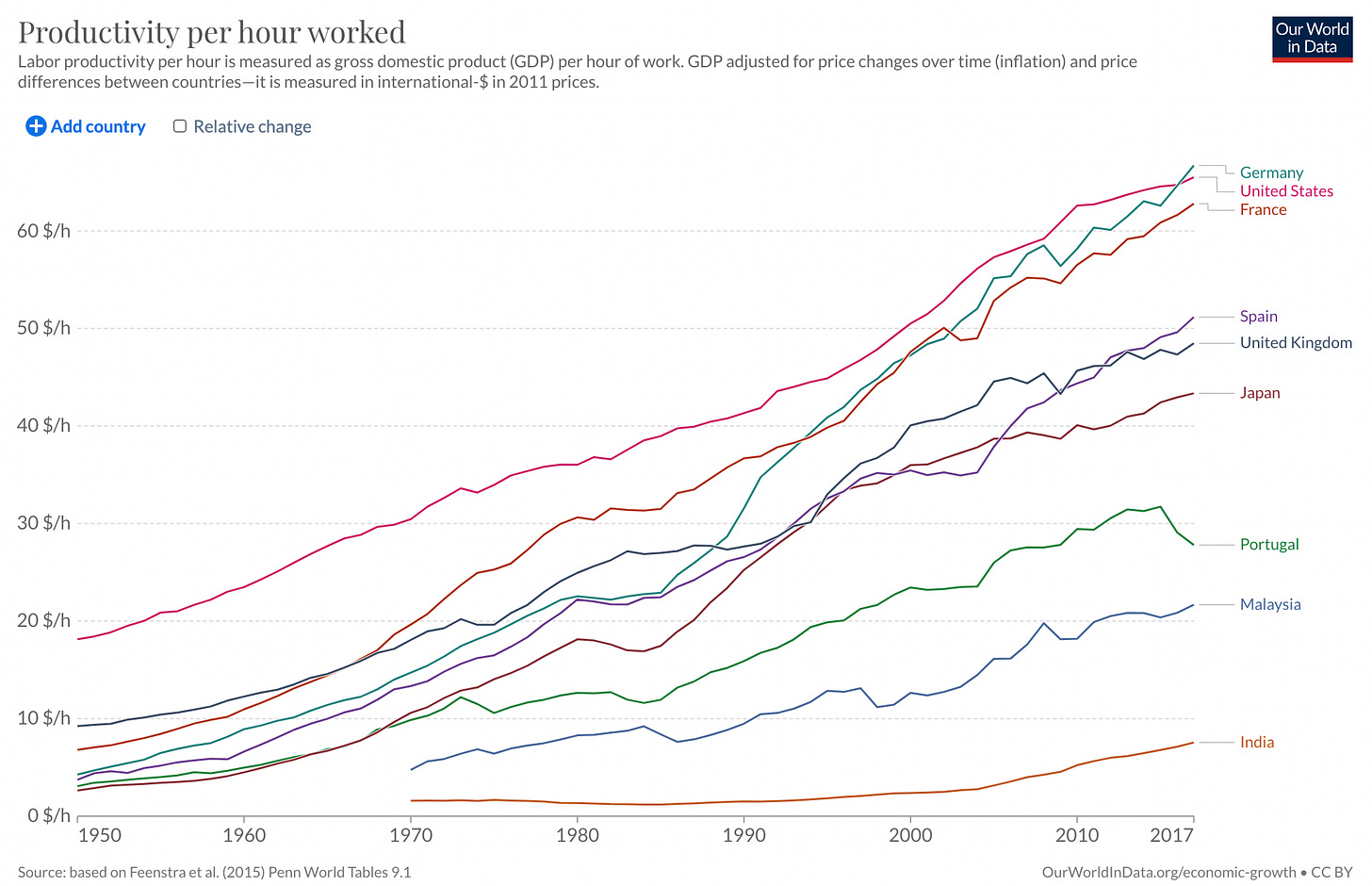How we work is changing
This is becoming a special point of focus especially for those who have seen the difference during the COVID lockdowns
Humans are built to have a biphasic sleep routine. Normally, the two phases of sleep are at night and in the afternoon. You feel sleepy after lunch not because you are lazy but because it is what humans did for thousands of years. Children and growing teens need more sleep than adults, they sleep through the morning because they are growing bones and stuff, not because they are lazy.
Then the industrial revolution happened.
The best way to run a factory was to get people to perform 12-hour shifts. (8 hours was hard-fought and won) There went bi-phasic sleep. People who needed it were branded lazy. The factory needed to start at 9 AM and so the kids were forced to wake up at 6 AM and report to school by 7 AM so that the parents could be free to work by 9 AM. All this was done in the name of productivity.
Over the last 100 years productivity has gone up many folds. Keynes had predicted that the working hours of people by the end of the 20th century would be 15 hours a week due to incredible improvement in productivity. That never came to be.
Source: OWID
The number of hours that people have been putting in at work has only gone up. Why is that?
Why work so many hours?
We live in a world of constant inflation. Governments like to maintain this at around 3%. At that rate, costs double in 23 years. Salaries don’t. Especially for those who are working at the bottom of the organisation.
For more than 2 decades now, the US has had an inflation rate of 1% to 3.5%. If you buy an item for $10, a year later it is likely going to cost you $10.1 - $10.35. Nobody would even notice this. Worse, at a one per cent inflation over a prolonged period of time, while prices might move from $10 to $12/$13, it happens so gradually that nobody would realise the changes taking place. The sudden doubling of inflation makes the changes in pricing obvious.
For companies that need to compensate their workers, when inflation is at 1% giving them a 3% hike and letting them know that they are going to comfortably beat inflation is easy. The more blue-collar your work, the truer this is.
As inflation hits 7%, claiming to be providing a hike 3 times the inflation becomes far more difficult.
Note that the salary increase often has no relationship with the growth of the company. Those people partook in delivering that growth! It is only based on what you need to beat inflation.
As if to prove my point.
Lloyd’s, the biggest bank in the UK, announced this week that it would give employees a one-time bonus of £1,000 (US$1,200) to offset the rising cost of living.
The vast majority of the bank’s employees—some 64,000 workers—will be eligible for the bonus, but senior managers and executives would be excluded, Reuters reported. “The move highlights the pressures on employers to help mitigate the impact of price rises on staff,” the news outlet wrote.
Source: Quartz
In a world where few people on the top appropriate the effort of many, the only way to keep up with costs are by working longer hours. Costs are going up, salaries are not, hence you work longer.

The cost of living is different from inflation. 15 years ago, if you did not have a mobile phone it would have been just fine. Today, not only will you be treated like you have been living under a rock; also you will also lose opportunities. So when I say costs go up, that is different from prices going up.
In the book Bullshit Jobs, David Graeber calls out many white-collar jobs as Bullshit.
Say, there was nothing called money in the world. Your basic needs are taken care of. If you were not going to be paid a dime for what you are doing, would you still do it? No salary, no commission, no upside, nothing.
If your answer is no. You probably have a bullshit job.
I think everyone in Finance will quit.
The people with bullshit jobs are often paid a lot more than those who have meaningful work. No wonder the pushback on the number of hours put in, is coming from them.
For the next six months (beginning June 6), employees of participating companies will work 80% of their usual hours while earning the same pay. Workers will be expected to maintain the same level of productivity, per the trial’s “100:80:100” model. (Employees make 100% of their pay, working 80% of their prior schedule, maintaining 100% of their prior output.)
The massive experiment was co-organized by 4 Day Week UK Campaign and 4 Day Week Global, a nonprofit group led by Andrew Barnes, the founder of a New Zealand insurance company who first cut his own firm’s workweek in 2018, inspired by some airplane reading. The shorter week left his employees feeling more motivated and productive, and Barnes has been advocating for more organizations to make the switch ever since.
Source: Quartz
There are two things at play over here.
COVID not only disrupted but pulled down the veil from the charade of office work. It became obvious to many how much time was really being wasted at the office. No product launch stopped, no system was halted entirely, and none of the white-collar workers showed up to work for an entire year.
On the other hand, people saved hours commuting and even more by not socialising at work.
The cost savings that this resulted in, as well as the time that they could provide for their personal life/pursuits certainly made them happier.
While London is experimenting, others are codifying it in law.
Lithuania is the latest country to try out a four-day workweek, thanks to a policy passed by lawmakers yesterday (April 21).
Under the new policy, which will take effect next year, public-sector employees with children under the age of three will be allowed to work 32 hours a week without any reduction in their pay. A standard workweek in Lithuania is 40 hours.
Source: Quartz
Belgium’s prime minister recently OK’d the idea as part of a suite of workplace reforms passed last month. His government is the latest in a long list of national and local governments ready to try shorter weeks.
And workers are taking note. In the US, a new survey by Qualtrics found that an astonishing 92% of workers like the idea of working four 10-hour days every week, instead of five days per week for eight hours. One in three (37%) said they would choose a shorter workweek even if that means taking a pay cut, and 82% said that they would be more productive on a condensed schedule.
Source: Quartz
The smaller the country, the fewer the lobbies, and the easier it is to pass a bill.
4dayweek is mobilising companies from across the world to join the movement to deliver a 4-day work week. They are seeking to organise Pilot programs only in the English-speaking world for now.
I am sure companies are not going to be happy about the idea. This is not about the number of hours being dedicated to the job. It is about the degree of control that companies have over the lives of their employees. Giving them more free time opens the door to the possibility of side projects. Some might choose to pursue social movements. Bullshit jobs exist precisely to preclude the possibility of such movements.
Will they make policy changes that leave the door open for such things to happen?



Mutiny round the corner if people are not kept occupied chasing their tails. 4 day week.....gun powder.